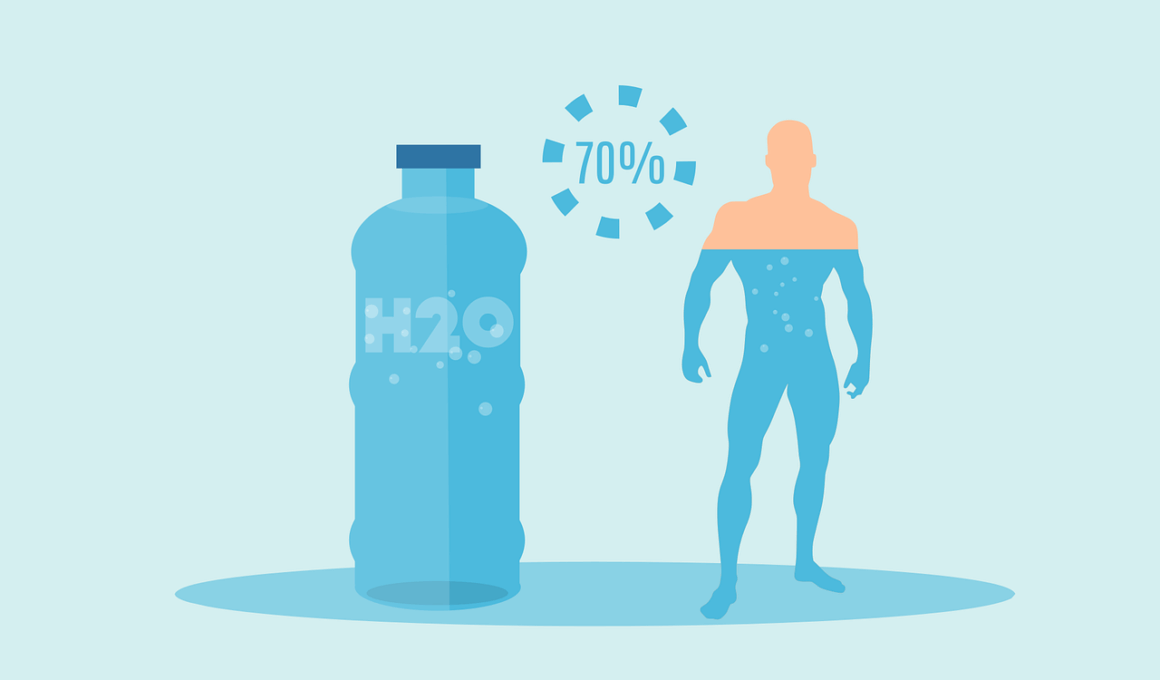Hydration and Its Impact on Volleyball Warm-up Efficiency
Hydration plays a crucial role in optimizing volleyball warm-up exercises, ensuring that athletes perform at their best. Dehydration can adversely affect muscle function, coordination, and overall performance. During warm-ups, movements should promote blood flow and enhance flexibility. Water replenishes fluid levels, crucial for maintaining peak physical performance. Studies indicate that even a mild degree of dehydration can reduce exercise performance, impairing reaction time and endurance. This directly impacts the quality of warm-up activities, emphasizing the need for regular hydration before extensive training sessions or competitions. Athletes must be aware of their hydration needs, especially during intense training, where sweating rates elevate. Those engaged in high-level volleyball training should consume fluids that restore electrolytes lost during such exertion. Moreover, monitoring the color of urine can serve as a simple indicator of hydration levels. Transparent urine typically signals adequate hydration while darker tones suggest the need for fluid intake. Thus, staying hydrated not only boosts energy levels but also supports concentration and focus during competitive play. Coaches also play a vital role by implementing hydration protocols effective for their training schedules and game participation.
In volleyball, specific warm-up exercises effectively prepare the body for intense physical activity. They should include dynamic stretches and sport-specific drills. When combined with proper hydration, these exercises enhance athletic performance, reducing injury risk. Effective warm-ups help increase heart rate and blood flow to muscles, promoting flexibility. Further, hydration supports this process by improving circulation, ensuring oxygen reaches critical muscle groups. Athletes can include exercises like lunges, arm circles, and high knees to engage various muscle factions. Moreover, sports drinks containing essential electrolytes may offer an excellent alternative to plain water. They aid in faster hydration and replenish lost salts, important for prolonged activities. It’s also important to start hydrating well ahead of training. A good rule is that athletes should drink water continuously throughout the day leading up to practice. Simple strategies, such as carrying a water bottle, can ensure regular fluid intake. Individual hydration needs vary based on factors like weight, sweat rate, and environmental conditions. Thus, educating athletes about their unique hydration needs helps optimize warm-up efficiency and overall performance during volleyball competitions.
The type of hydration consumed can significantly influence how effectively volleyball players warm up. During training sessions and matches, athletes often face challenging physical demands. Water is essential for maintaining hydration, yet sometimes, more specialized drinks, such as those containing carbohydrates and electrolytes, are preferable. These beverages can help replace lost minerals and provide energy when athletes push their limits. Electrolyte imbalances can lead to muscle cramps and reduced performance, which can hinder an athlete’s training and match results. Teams should encourage a hydration strategy that suits individual athletes based on their intensity levels and sweat rates. A hydration plan should be established, helping players know when and how much to drink. Especially in higher temperatures, maintaining adequate hydration becomes even more critical. Coaches can develop specific hydration protocols during warm-ups, ensuring sports drinks are accessible. Educating players about the signs of dehydration, like fatigue and dizziness, is crucial, providing them with tools to monitor their hydration. As an important foundation for healthy training habits, these strategies allow volleyball athletes to maximize their warm-up effectiveness while reducing the risk of injury.
Role of Nutrition in Hydration
Adequate hydration extends beyond just fluid intake; nutrition significantly impacts how athletes maintain hydration levels. Consuming foods with high water content, such as fruits and vegetables, can aid in hydration preservation. Hydration-rich foods like watermelon, cucumbers, or oranges contribute significantly to overall fluid intake, particularly during rigorous training. In addition to regular hydration strategies, incorporating these foods into an athlete’s diet enhances overall health and well-being. Nutrients and vitamins present in these foods also bolster the immune system, which is vital for athletes involved in high-intensity sports such as volleyball. Players should aim to integrate various hydrating foods into their meals and snacks, especially on game days. It’s equally essential for athletes to avoid excessive levels of caffeine or alcohol, which may contribute to dehydration and hinder performance. The timing of meals also plays a crucial role; athletes should organize their meal schedules to prevent competing with their hydration endeavors before practices. In understanding the full extent of what helps maintain hydration, volleyball players will feel more energetic throughout warm-ups and gameplay.
Effective communication regarding hydration needs within a volleyball team fosters a culture of health and optimal performance. Coaches, trainers, and athletes must collaborate to ensure that hydration goals are understood and met. Team meetings can serve as platforms for addressing hydration topics, allowing players to share their experiences and tips. Implementing hydration stations during practice can facilitate easy access to water or sports drinks, ensuring athletes remain hydrated throughout the warm-up. Coaches should monitor players actively during sessions, observing signs of dehydration or fatigue. Creating a supportive environment that encourages open communication regarding individual hydration needs helps athletes understand their bodies better. Furthermore, instilling knowledge about how hydration affects athletic performance can lead to better decision-making choices among team members. Athletes educated on hydration’s importance are likely to feel empowered in their performance. As a unified team, sharing accountability surrounding hydration can elevate everyone’s performance levels consistently. Establishing hydration leadership roles within the team may further motivate peer accountability. This proactive approach allows the entire team to feel a collective responsibility toward improved hydration practices, leading to increased overall success.
The Impact of Weather Conditions
Weather conditions play a significant role in volleyball warm-ups; athletes must tailor their hydration strategies accordingly. High-temperature environments can expedite fluid loss through sweating, making hydration essential. In contrast, colder weather may lead players to underestimate their hydration needs, leading to insufficient fluid intake. Understanding the relationship between weather and hydration is crucial for athletes to optimize their performance. It is vital to recognize that dehydration can occur even when temperatures are mild, given the exertion level. Coaches can assist players by educating them about appropriate hydration adjustments based on weather conditions. They should advocate for frequent breaks during warm-ups, encouraging athletes to hydrate proactively, regardless of whether they feel thirsty. During peak heat, players should consume fluids containing sodium to help retain water and prevent excessive loss through sweat. On the other hand, during cold weather, warm fluids can be beneficial both for hydration and maintaining body temperature. Frequent monitoring of fluid intake will ensure athletes become accustomed to maintaining hydration levels suitable for various weather situations, optimizing workout sessions and enhancing performance.
In conclusion, hydration significantly impacts volleyball warm-up efficiency and overall performance. Athletes must recognize the importance of pre-exercise hydration to prepare their bodies effectively. A systematic approach to fluid intake, combined with proper nutrition, prepares players not only for warm-ups but also for matches and training sessions ahead. Coaches and trainers should implement feasible hydration strategies and encourage athlete engagement, helping them understand their hydration needs better. Teams can foster a culture of health by emphasizing hydration at all levels of training. As athletes develop their hydration plans, they’ll notice an improvement in focus, stamina, and energy levels during practices. Regular education regarding hydration strategies equips volleyball players to advocate for their health needs. Moreover, collaboration between players and coaches strengthens this initiative. Finally, as champions of their hydration strategies, volleyball athletes can sustain high performance, reduce injury risks, and maintain overall health. Consistent hydration practices can translate into on-court success, fostering resilience and capability. The emphasis on hydration nurtures not only individual growth in volleyball but also a shared commitment to excellence within the entire team.
Future Directions in Hydration Research
Looking ahead, ongoing research into hydration strategies will undoubtedly provide further insights into optimizing athletic performance, especially in sports like volleyball. As methodologies evolve, understanding individual hydration needs and responses during complex physical exercises will become essential. Exploring hydration approaches specific to various demographics, such as age and fitness levels, may yield tailored recommendations for athletes. Scientific examination of the relationship between hydration and cognitive function during hydration will enrich training methodologies. Future studies could investigate using technology, such as hydration sensors and apps, to assist athletes in managing their hydration levels conveniently. The integration of these methods will streamline hydration assessments; providing immediate feedback will empower athletes to take ownership of their hydration practices. These efforts will lead to improved practices, ensuring hydration is prioritized as part of athletes’ regular training regimens. Ultimately, this research’s findings will contribute to the development of protocols that promote optimal hydration across all levels of volleyball. Establishing guidelines informed by scientific evidence empowers athletes and coaches alike; this ensures they are equipped to achieve peak performances and long-term success in their volleyball endeavors.


